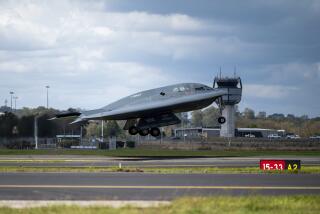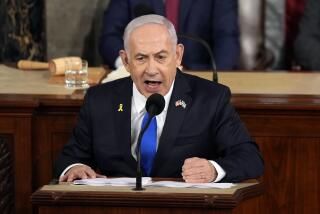U.S. arms sold to Saudis are killing civilians in Yemen. Now the Trump administration is set to sell them more
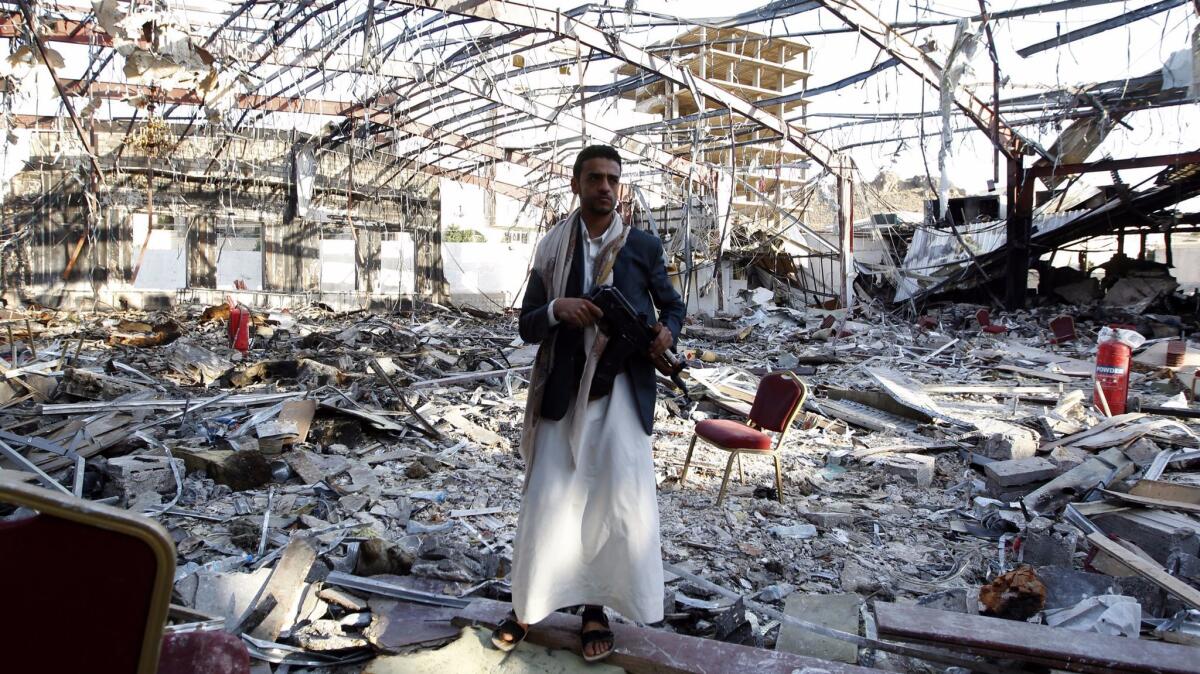
Reporting from Sana, Yemen — Faded pictures of the dead line the walls outside what once was this battered city’s grandest reception hall.
At least 140 people perished here in the Yemeni capital last fall when a Saudi Arabian-led military coalition carried out a pair of airstrikes on a funeral. Human rights groups labeled the attack a possible war crime and said the bombs used were manufactured in the United States.
The attack, one of the deadliest for civilians in the coalition’s relentless air war against Iranian-backed rebels in Yemen, helped persuade the Obama administration in December to block the sale of precision-guided munitions to the Saudi military until it addresses problems with its targeting.
But the hold was lifted last month, when President Trump announced a $110-billion package of proposed military sales to the kingdom, part of an effort to shore up a regional alliance against a resurgent Iran. The decision has left many among Yemen’s increasingly desperate population feeling abandoned and betrayed.
“There is nothing in this world that I hate more than Americans,” Ali Mohammed Murshed, a 32-year-old deliveryman in Sana, said as he paused to take in the reception hall’s charred and mangled frame on his way to visit a friend. Murshed used to rent a house nearby, but fled with his family to an in-law’s home after their windows were blown out in the attack.
“With all the arms they have given to Saudi Arabia, the Saudis have achieved nothing after more than two years but killing civilians and destroying infrastructure,” he complained bitterly.
The State Department says the arms package, announced during Trump’s recent visit to the Saudi capital, Riyadh, will help a key Middle East ally defend itself against “malign Iranian influence” and contribute to counter-terrorism operations across the region. In addition to replenishing the kingdom’s dwindling supply of precision-guided bombs, the administration is offering howitzer artillery pieces, Blackhawk helicopters and the antimissile system known as Terminal High Altitude Area Defense, or THAAD.
The Saudis say they need the weaponry to defend themselves against Yemeni rebels, who they charge are being armed by Shiite Muslim Iran in a bid to increase its clout against the region’s Sunni monarchies. The rebels, known as Houthis, surged out of their northern strongholds in September 2014 and seized control of Yemen’s capital with the help of rogue elements of the armed forces loyal to the country’s deposed strongman, Ali Abdullah Saleh.
Six months later, Saudi Arabia assembled a military coalition to restore power to the internationally recognized president, Abdu Rabu Mansour Hadi, who set up a parallel government in Yemen’s southern port city of Aden.
The Houthis have lobbed thousands of mortar shells and rockets into Saudi territory in response to the coalition’s campaign and claimed to have aimed a ballistic missile at Riyadh the day before Trump arrived. (The strike was not successful.)
“We don’t want people to think we are purchasing weapons to have influence,” said a high-ranking Saudi defense official who was not authorized to discuss the deal publicly. “We respect the sovereignty of countries. But if there is a threat to our borders, we need to defend ourselves.”
Although all sides in the war stand accused of abuses, United Nations officials attribute most of the heavy civilian toll to the air campaign waged by Saudi Arabia and its Persian Gulf allies. The fighting has killed more than 10,000 people, destroyed vital infrastructure and pushed what was already the Arab world’s poorest nation to the brink of a humanitarian catastrophe.
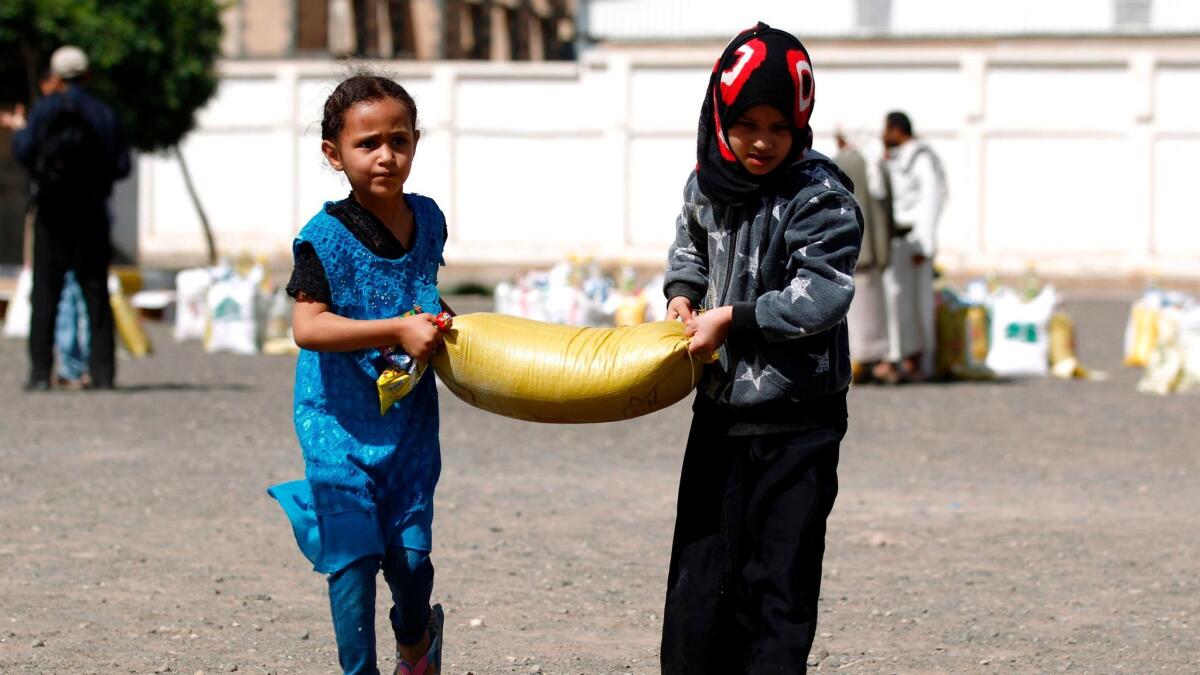
Nearly a quarter of Yemen’s 27 million people are “one step away from famine,” U.N. humanitarian chief Stephen O’Brien told the Security Council last month.
The economy is collapsing; government employees have not been paid for months; prices for food and fuel have skyrocketed; half the country’s health facilities are closed and a raging cholera epidemic is killing hundreds.
“This is not an unforeseen or coincidental result of forces beyond our control,” O’Brien said. “It is a direct consequence of actions of the parties and supporters of the conflict.”
The bustling capital, which is jammed with people displaced by fighting elsewhere, has been spared the worst of the war. But residents live in fear of the coalition jets that roar overhead, unleashing their payloads into densely packed neighborhoods and military installations on the outskirts of the city.
U.N. officials and human rights groups accuse the coalition of recklessly bombing hospitals, markets, schools and homes, in violation of international law.
Human Rights Watch says it has documented 81 potentially unlawful strikes, and of those, 23 were found to have been carried out with U.S.-made bombs. They include a March 2016 strike on a market in the northwestern village of Mastaba that killed more than 100 people and the October attack on the funeral in Sana.
Naser Ali Mohammed was among hundreds who thronged the reception hall that afternoon to offer condolences to a prominent family mourning the death of a senior rebel politician’s father.
The first bomb hit at 3:20 p.m., filling the hall with smoke and flames as parts of the ceiling started to collapse. Less than 10 minutes later, as first responders rushed to the aid of survivors, a second bomb crashed into their midst.
One of Mohammed’s uncles died in the attack, he said. Mohammed, 34, cannot escape the memory. He guards a construction site across the street from the hall’s ruins.
“I saw death before my eyes,” he said, “and until today I still wake up screaming.”
The Saudi-lead coalition acknowledged that one of its jets carried out the attack and blamed faulty intelligence. Saudi military officials say they make every effort to avoid civilian casualties and blame the Houthis, who they say have made hostages of Yemen’s population.
But the growing toll has galvanized opposition in the U.S. to Saudi arms deals.
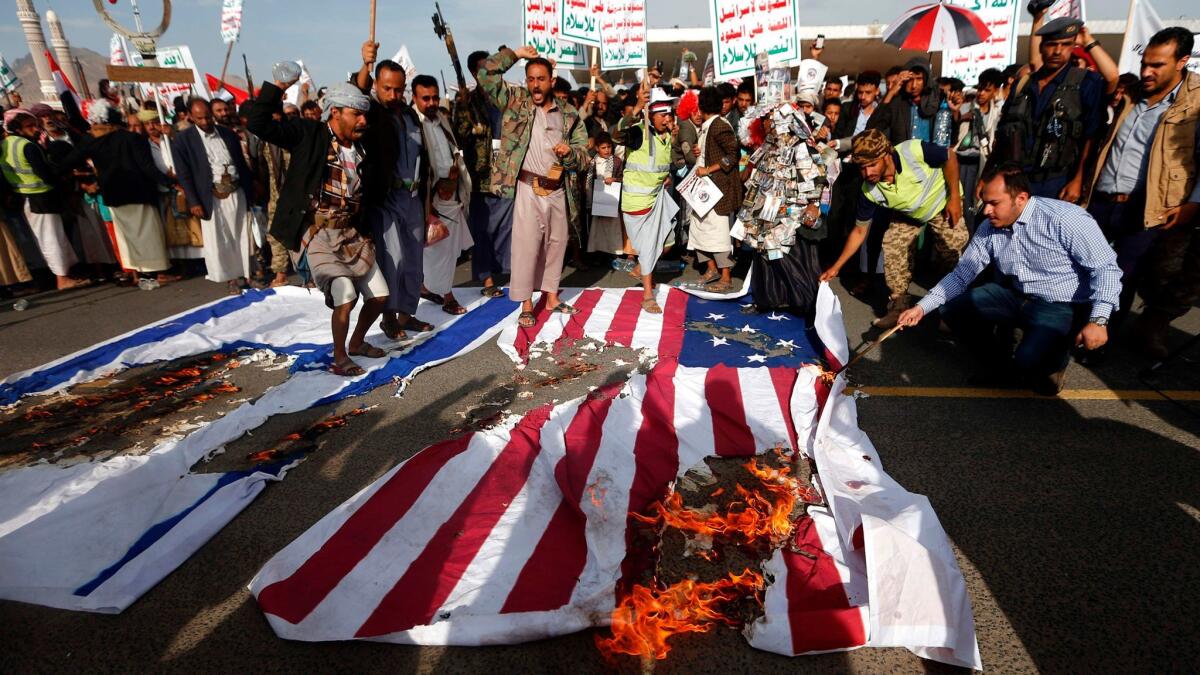
At the end of a review prompted by the funeral attack, President Obama blocked the sale of thousands of GPS-guided “smart” bomb kits to the Saudi military. Those same weapons are among those that Trump has now green-lighted, although much of the deal still requires congressional approval.
A bipartisan effort to halt the sale, worth about $500 million, was narrowly defeated in the Senate on Tuesday. “This barbaric nation should not be getting our weapons,” said Sen. Rand Paul (R-Ky.), who sponsored the resolution.
The U.S. has also resumed some intelligence sharing that was put on hold under Obama, officials on both sides said. Other support was never halted, including aerial refueling for the jets that drop the bombs.
Human rights activists warn that continuing to provide such help to a country accused of violating the laws of war puts the U.S. at risk of complicity in future unlawful attacks. “Under international law, you don’t need to want a weapon that you deliver to be used unlawfully to potentially be guilty of aiding and abetting,” said Kristine Beckerle, the Yemen researcher at Human Rights Watch.
The support has also generated more hostility to the U.S. in a country where American special forces are stepping up counter-terrorism operations against Al Qaeda’s most potent affiliate, including an ill-fated raid in January that killed two dozen civilians along with militants and a U.S. Navy SEAL commando.
The week that Trump was in Riyadh, thousands took to the streets in Sana to protest “U.S. terror in Yemen.” In mosques across the city, imams railed against the U.S.-Saudi arms deal at Friday prayers.
“This proves that America has never been the guardian of democracy and human rights, like it tries to portray itself,” said Mohammed Aiyash, the 40-year-old editor of a now-shuttered Sana newspaper.
U.S. defense officials say they do not select the coalition’s targets and have made their concerns known about the number of civilian casualties in Yemen.
“The U.S. continues to recommend that the Saudi military leadership investigate all incidents of civilian casualties allegedly caused by airstrikes and has asked that the coalition reveal the results of these investigations publicly,” said Christopher Sherwood, a Pentagon spokesman.
Some defense officials question the wisdom of denying the Saudis precision-guided munitions that could, if used correctly, actually help reduce such casualties.
“There’s an honest question: Do you save more civilian lives if you try to guide the Saudis, or you leave them to handle things on their own?” said Jon B. Alterman, who heads the Middle East Program at the Center for Strategic and International Studies in Washington. “All the military people I’ve spoken to come down on the side that you are going to save a lot more lives if you work with them.”
Some U.S. officials have suggested that it may be necessary to step up military support for Saudi Arabia and the United Arab Emirates in Yemen in order to bring the Houthis and their allies to the negotiating table.
“Our goal is to push this conflict into the U.N.-brokered negotiations to ensure that it ends as soon as possible,” Secretary of Defense James N. Mattis said in Riyadh last month.
Critics counter that the U.S. is fueling an unwinnable war. But even if a settlement is reached, it is unlikely to bring an end to Yemen’s misery. Many here expect fighting to break out between the Houthis and Saleh supporters; senior figures in the south are agitating for secession, and militants loyal to Al Qaeda and Islamic State are capitalizing on the chaos to extend their reach.
“Yemen is just wickedly hard,” Alterman said. “People want obvious answers. Yemen doesn’t give you any obvious answers.”
Twitter: @alexzavis
Times staff writer Zavis reported from Los Angeles and special correspondent Ahmed from Sana. Staff writers Michael A. Memoli and W.J. Hennigan contributed from Washington and Molly Hennessy-Fiske contributed from Riyadh.
UPDATES:
2:15 p.m.: This article was updated to report that an effort to halt a portion of the arms sale to Saudi Arabia was defeated in the Senate on Tuesday.
This article was originally published at 10:40 a.m.
More to Read
Sign up for Essential California
The most important California stories and recommendations in your inbox every morning.
You may occasionally receive promotional content from the Los Angeles Times.
